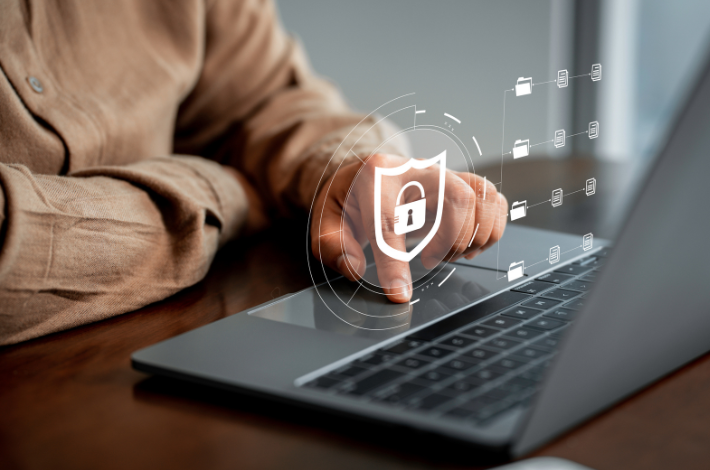While you’re busy shopping for gifts this holiday season, scammers are shopping for your information. Fraud can happen to anyone, anytime. It doesn’t wait until life slows down (in fact, it always seems to show up when you’re juggling the most!) and it rarely happens just once.
Fraud is an unfortunate reality we all have to face, and it’s only getting smarter. Many people think it only comes in the form of card skimming or suspicious email links, but it can be tricky and take many different forms. Here are a few common ways fraud can show up, and some of the best ways to protect yourself, especially during this season of giving.
Text and Email Scams
Often called “smishing” (text) and “phishing” (email), these scams are designed to catch you off guard and spark a quick and emotional reaction. One of the most common examples during the holidays is a fake shipping update claiming your package is delayed or there’s a problem with your order. The message usually includes a link urging you to “track your package” or “confirm your details.” Since online shopping spikes this time of year, it’s easy to assume the message is legitimate and click without thinking twice.
If you get an urgent or time sensitive text or email, take a moment to pause before you act. Read the full email address or phone number it came from and look closely for small errors that might not stand out at first glance, like a zero used instead of an “o” or an extra letter added to a familiar name. Logos, colors, and even tone can be copied easily, so don’t rely on those as proof it’s real.
Your safest move is to go directly to the company’s official website to verify any claims. Find their contact information there and reach out through those channels. Do not call or reply to the number or address that contacted you, as those can be fake.
Another common version of this scam looks more personal. You might get a message that seems to come from a co-worker or family member saying they’re in a bind and need you to buy a gift card right away. In those cases, reach out to that person through a phone number or method you already know to confirm before taking action. The messenger might try to tell you they’ve recently gotten a new number, but don’t take that at face value. Always verify by using the contact information you already have. Staying cautious with unexpected messages or urgent requests can help protect your information and money!
Online Shopping safety
Online shopping has made life so much easier! Gone are the days of waiting in long lines to score a deal on the latest gadget. But while the convenience is great, it’s also opened the door for online hustlers who are getting better at tricking people out of their hard-earned money.
As you browse for gifts, keep an eye out on where you’re clicking. Search results often show “Sponsored” content first which can sometimes lead to sketchy sites pretending to be the real thing. Skip those and go straight to a retailer you know and trust. And if you stumble on a deal that seems too good to be true, like the latest kitchen appliance 95% off, it probably is.
Before you hit the “buy now” button, take a look at the web address. A secure site will always start with https (that little s stands for “secure”). And while it’s tempting to save your payment info for next time, don’t do it. If a site ever gets hacked, that stored card data is the first place scammers go.
Whenever you can, use a credit card instead of a debit card. Credit cards usually offer stronger protections if something goes wrong. And finally, avoid shopping on public Wi-Fi, like the airport or your favorite coffee shop. Those networks can have very weak security and allow a hacker to snoop your information.
Charity Scams
As sad as it may sound, swindlers often take advantage of people’s desire to give and help during the holiday season. Steer clear of these scams as they can be difficult to track and make recovering your money even more challenging.
These frauds can show up in many forms. Sometimes, people pose online as individuals in need. You might see posts on social media or other forums from someone saying they just need a little help paying rent or buying gifts for their children. When asked, they’ll usually want you to send them money directly or buy gift cards. As a good rule of thumb, if you’ve never met the person in real life, it’s best not to send money directly.
If you want to support those in need, donate through reputable charities. These can be local or nationwide organizations, but they should have an official website or office you can contact to learn more about how your donations will be used. Never give out your personal information online, such as bank account details or your address, to anyone claiming to be someone in need. If you’re ever unsure whether a charity is legitimate, you can check Charity Navigator or GuideStar to confirm the organization’s authenticity.
These are just a few common scams you might come across. It’s important to stay vigilant and use healthy skepticism when it comes to money, personal information, and online security. Set up account alerts and check transactions often. When possible, enable two-factor authentication so that any time someone tries to log in to an online account, you’ll get a message sent to your phone. Keep your contact information up to date with your financial institution so fraud alerts reach you quickly.
Staying alert is your best defense. Remember, Crane Credit Union is always here to help if something looks suspicious on your account. You can call us or use our 24/7 chat line for quick assistance if something happens. Adding our contact information to your phone is a helpful way to know when it is truly us reaching out. If you are ever unsure, hang up and contact us through the phone number on our verified website or the saved contact information you know belongs to CCU. In a time where fraud has gotten smarter, being overly cautious about verifications and security will only serve you and protect your hard-earned assets.








